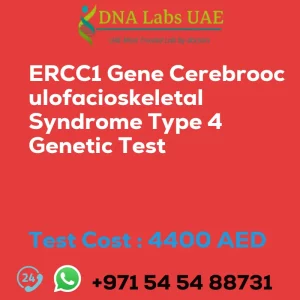PRKD1 Gene Congenital Heart Defects and Ectodermal Dysplasia Genetic Test
Test Name: PRKD1 Gene Congenital heart defects and ectodermal dysplasia Genetic Test
Components: Blood or Extracted DNA or One drop Blood on FTA Card
Price: 4400.0 AED
Report Delivery: 3 to 4 Weeks
Method: NGS Technology
Test Type: Dysmorphology
Doctor: Pediatrics
Test Department: Genetics
Pre Test Information: Clinical History of Patient who is going for PRKD1 Gene Congenital heart defects and ectodermal dysplasia NGS Genetic DNA Test. A Genetic Counselling session to draw a pedigree chart of family members affected with PRKD1 Gene Congenital heart defects and ectodermal dysplasia NGS Genetic DNA Test gene PRKD1
Test Details
The PRKD1 gene is associated with a genetic condition called congenital heart defects and ectodermal dysplasia (CHDED). CHDED is a rare disorder characterized by abnormalities in both the development of the heart and the ectodermal tissues, which include the skin, hair, nails, and teeth.
NGS (Next-Generation Sequencing) genetic testing is a powerful tool used to analyze multiple genes simultaneously. In the case of CHDED, NGS can be used to sequence the PRKD1 gene to identify any mutations or variants that may be present. This type of genetic testing can provide valuable information about the genetic cause of the condition and help with diagnosis, prognosis, and treatment planning.
Identifying mutations or variants in the PRKD1 gene through NGS testing can also have implications for family planning and genetic counseling. If a mutation is identified, it can be used to assess the risk of passing the condition on to future generations and provide information about potential treatment options or interventions.
It is important to note that NGS testing is typically performed by a qualified geneticist or genetic counselor and should be interpreted in the context of a comprehensive clinical evaluation. Genetic testing alone cannot definitively diagnose or predict the severity of CHDED, as other factors may contribute to the development and progression of the condition. Therefore, it is recommended to consult with a healthcare professional specializing in genetics for a complete assessment and interpretation of the results.
| Test Name | PRKD1 Gene Congenital heart defects and ectodermal dysplasia Genetic Test |
|---|---|
| Components | |
| Price | 4400.0 AED |
| Sample Condition | Blood or Extracted DNA or One drop Blood on FTA Card |
| Report Delivery | 3 to 4 Weeks |
| Method | NGS Technology |
| Test type | Dysmorphology |
| Doctor | Pediatrics |
| Test Department: | Genetics |
| Pre Test Information | Clinical History of Patient who is going for PRKD1 Gene Congenital heart defects and ectodermal dysplasia NGS Genetic DNA Test. A Genetic Counselling session to draw a pedigree chart of family members affected with PRKD1 Gene Congenital heart defects and ectodermal dysplasia NGS Genetic DNA Test gene PRKD1 |
| Test Details |
The PRKD1 gene is associated with a genetic condition called congenital heart defects and ectodermal dysplasia (CHDED). CHDED is a rare disorder characterized by abnormalities in both the development of the heart and the ectodermal tissues, which include the skin, hair, nails, and teeth. NGS (Next-Generation Sequencing) genetic testing is a powerful tool used to analyze multiple genes simultaneously. In the case of CHDED, NGS can be used to sequence the PRKD1 gene to identify any mutations or variants that may be present. This type of genetic testing can provide valuable information about the genetic cause of the condition and help with diagnosis, prognosis, and treatment planning. Identifying mutations or variants in the PRKD1 gene through NGS testing can also have implications for family planning and genetic counseling. If a mutation is identified, it can be used to assess the risk of passing the condition on to future generations and provide information about potential treatment options or interventions. It is important to note that NGS testing is typically performed by a qualified geneticist or genetic counselor and should be interpreted in the context of a comprehensive clinical evaluation. Genetic testing alone cannot definitively diagnose or predict the severity of CHDED, as other factors may contribute to the development and progression of the condition. Therefore, it is recommended to consult with a healthcare professional specializing in genetics for a complete assessment and interpretation of the results. |








